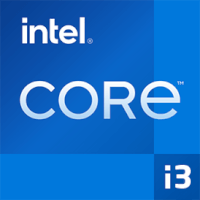
The processor Intel Core i3-11300 is developed on the 14 nm technology node and architecture Rocket Lake S. Its base clock speed is 3.90 GHz, and maximum clock speed in turbo boost - 4.40 GHz. Intel Core i3-11300 contains 4 processing cores. To make a right choice for computer upgrading, please get familiar with the detailed technical specifications and benchmark results. Check socket compatibility before choosing.
 CPU Cores and Base Frequency CPU Cores and Base Frequency |
||||
|---|---|---|---|---|
| Frequency | 3.90 GHz | Cores | 4 | |
| Turbo (1 Core) | 4.60 GHz | CPU Threads | 8 | |
| Turbo (All Cores) | 4.40 GHz | |||
| Hyperthreading ? | Yes | Overclocking ? | No | |
| Core architecture | normal | |||
 Internal Graphics Internal Graphics |
|
|---|---|
| GPU name | Intel UHD Graphics 630 |
| GPU frequency | 0.35 GHz |
| GPU (Turbo) | 1.20 GHz |
| Generation | |
| DirectX Version | 12 |
| Execution units | 24 |
| Shader | 192 |
| Max. Memory | 64 GB |
| Max. displays | 3 |
| Technology | 14 nm |
| Release date | Q4/2017 |
 Hardware codec support Hardware codec support
|
|
|---|---|
| H264 | Decode / Encode |
| H265 / HEVC (8 bit) | Decode / Encode |
| H265 / HEVC (10 bit) | Decode / Encode |
| VP8 | Decode / Encode |
| VP9 | Decode / Encode |
| AV1 | No |
| AV1 | No |
| AVC | Decode / Encode |
| JPEG | Decode / Encode |
 Memory & PCIe Memory & PCIe
| ||||
|---|---|---|---|---|
| Memory type | DDR4-2933 | |||
| Max. Memory | 128 GB | |||
| Memory channels | 2 | ECC | No | |
| PCIe version | 3.0 | PCIe lanes | 16 | |
 Thermal Management Thermal Management
| ||||
|---|---|---|---|---|
| TDP (PL1) | 65 W | TDP (PL2) | ||
| TDP up | -- | TDP down | -- | |
| Tjunction max | 100 °C | |||
 Technical details Technical details
| |
|---|---|
| Instruction set (ISA) | x86-64 (64 bit) |
| Architecture | Rocket Lake S |
| L2-Cache | -- |
| L3-Cache | 8.00 MB |
| Technology | 14 nm |
| Virtualization | VT-x, VT-x EPT, VT-d |
| Release date | Q2/2021 |
| Socket | LGA 1200 |
Cinebench R23 is the successor of Cinebench R20 and is also based on the Cinema 4 Suite. Cinema 4 is a worldwide used software to create 3D forms. The single-core test only uses one CPU core, the amount of cores or hyperthreading ability doesn't count.
The theoretical computing performance of the internal graphics unit of the processor with simple accuracy (32 bit) in GFLOPS. GFLOPS indicates how many billion floating point operations the iGPU can perform per second.